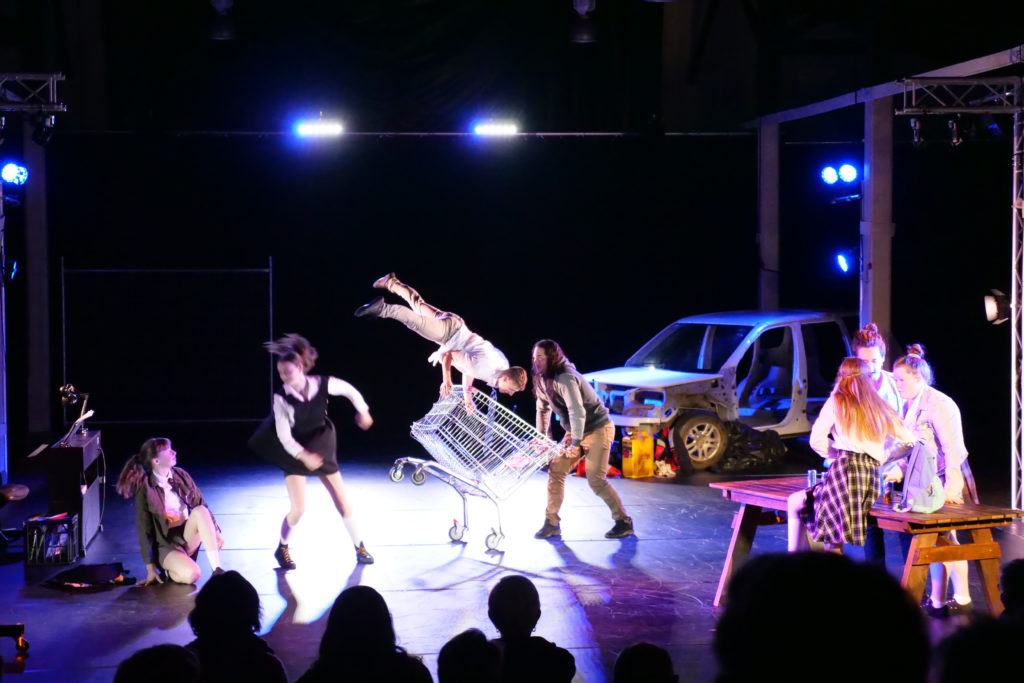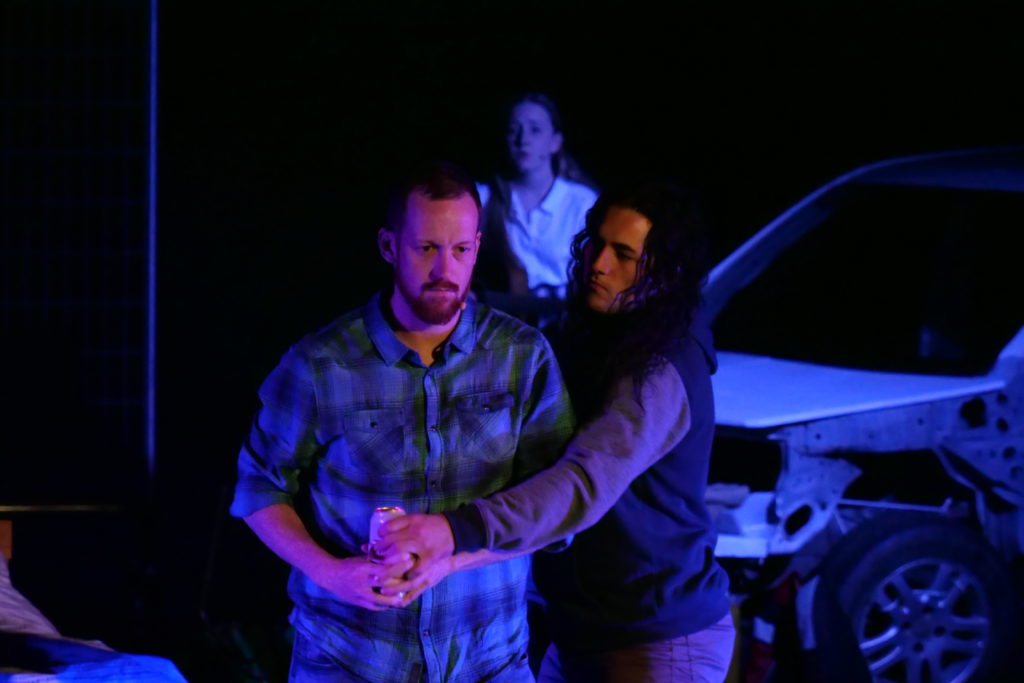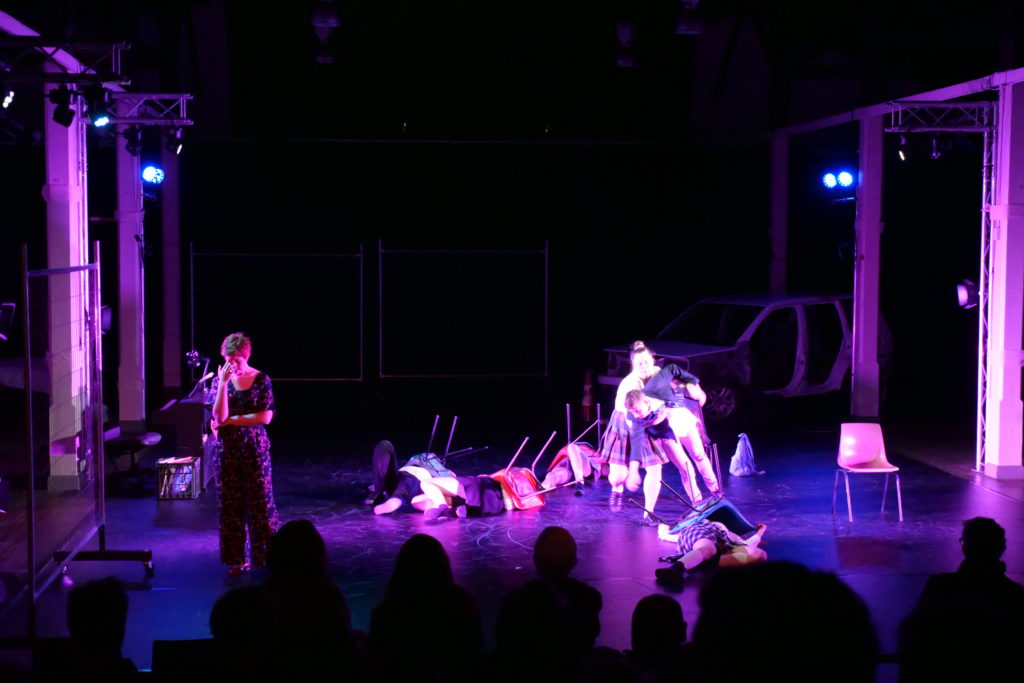Foundation for Rural & Regional Renewal (FRRR)
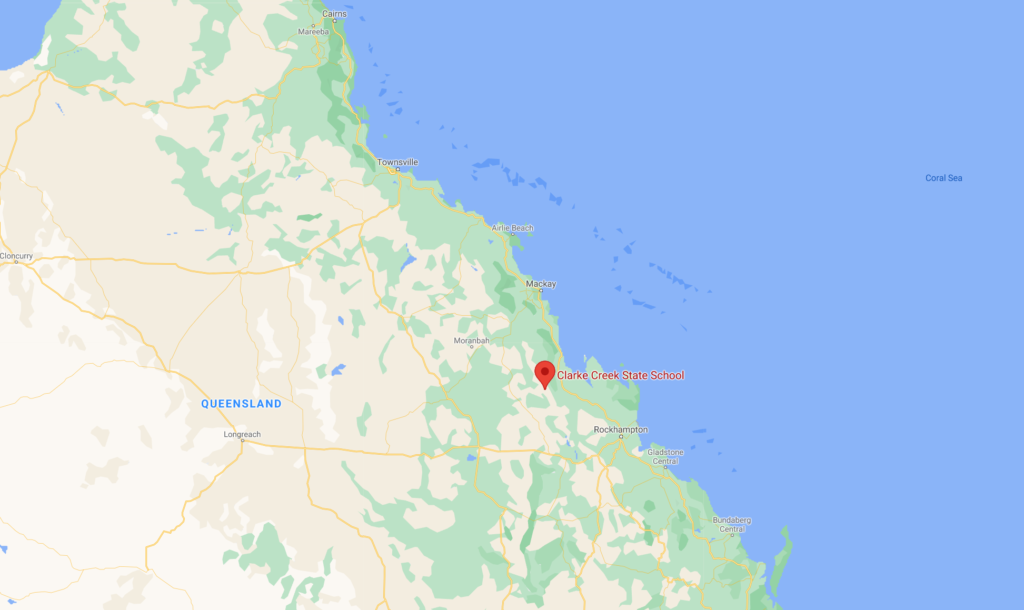
In the remote locality of Clarke Creek in Queensland’s Isaac Region, a community of 320 people have been doing it tough in recent years. In March 2017 Tropical Cyclone Debbie and flash flooding devastated the area, and then came the drought.
People from Clarke Creek mostly own or work on cattle stations, many run by extended and intergenerational family groups. School-aged children in the area were exposed to many impacts of Cyclone Debbie – from damage to community and family infrastructure, livestock and pet animal losses, to financial strain putting pressure on their families.
A problem-solving school
The saving grace of this community is the Clarke Creek State School (CCSS), which, in the absence of a township, serves as the community hub. It caters to the needs of 17 students from Kinder to Year 6, extends support to siblings, parents and extended families of those students, and provides a meeting place for all groups in the area, including the P&C Association.
The Clarke Creek P&C Association knew it was critical to support children through all this, and that school can help facilitate healing by providing the sense of normality that’s needed after a disaster. Since residents of Clarke Creek had to travel up to 230kms to access health and professional services, the P&C Association knew that, for help to be constructive, it would need to be brought into Clarke Creek.
The school had previously gained the services of a chaplain directly though the National Schools Chaplaincy Program, however the school could only afford one visit per fortnight without outside funding. By late 2018, it was clear that there was a need for ongoing disaster support for families. With so many pressures affecting the ability to fundraise locally in the tiny community, the P&C Association applied to FRRR’s In a Good Place program. A grant of $10,000 funded by CCI Giving essentially doubled the chaplain’s visits to weekly from July 2019 until March 2020, when the Department of Education funding applications opened.
Chaplaincy support proves vital
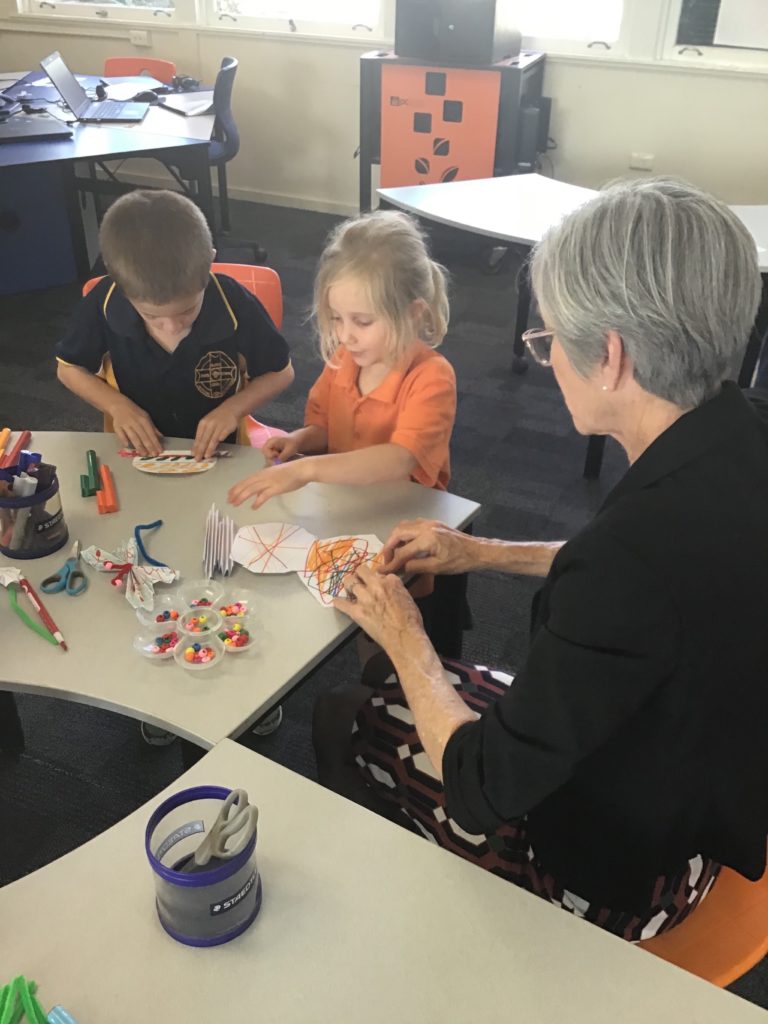
In small schools, the school chaplain is often the welfare provider, and plays a key part of the school support team.
The chaplaincy support at CCSS started shortly after the school and community were devastated by cyclone Debbie, and proved to be highly valuable to students, staff and the broader community, in their ongoing recovery and general mental health and wellbeing. The chaplain attends the school one day each week, working with the children in groups and one on one sessions. She provides emotional support and fosters leadership and kindness in the classroom, playground, and at school events.
“Chappy’, as she is fondly nicknamed, has been imparting those crucial life skills to the children and helping them to deal with the many challenges unique to living in a remote community in an isolated context.
It was a crucial time to bring in extra support, and the P&C Association don’t make light of the importance of Chappy’s role. Throughout COVID-19, the chaplain helped children deal with changes to their learning and became a central figure of stability for parents and the wider community.
The CCSS Principal notes how important the chaplain is in helping students transition through their education.
“I think the older students love the way she makes sure they all know that they have a voice and that someone cares enough to make the time to listen. She helped prepare older students for boarding school, and taught younger ones to be engaged in learning and practising kindness.”
The chaplain attends school and community events, and works with other schools in the cluster, thus creating support networks in the broader communities and creating an inclusive atmosphere and strengthened sense of community. But it’s the flow-on effects from the children’s gains that have the greatest power, as described in the final report:
“Our greatest achievement has been just stabilising our community. Oddly, this was really achieved through the children coming home from school with this positive energy and outlook from their time with Chappy, rather than working direct with parents and community. When the parents knew the kids would be ok and had someone strong to lean on, it was like a weight lifted and the school became the place of ‘normalcy and support’. Things picked up from there.
“In a small school and community, we have to stick together. Chappy has fostered this sense of belonging and caring in our children and it emanates from there.”
Tackling stigma around youth mental health
Mental health difficulties are the most common health challenges for young people, with between 20-25% of Australian adolescents experiencing a mental health or substance abuse issue in any given year. In the Bega Valley, youth mental health has been identified as a major issue facing the region. With a lack of public transport, limited education opportunities and few social spaces for young people – outside of playing a sport – a youth dance organisation has become an important alternative and a vital hub for self-expression and creativity.
Bega-based fLiNG Physical Theatre provides opportunities for young people to work with local and visiting professional artists to create original contemporary performance projects. They aim to give voice to regional perspectives, and designed a powerful youth-centric research and performance project called ‘My Black Dog”, which set out to learn about and support the mental health of young people living in the Bega Valley.
The project had two components; the creation of a moving, original performance exploring youth mental health, and the design and delivery of wellbeing workshops for high school students exploring how they can creatively and practically support their wellbeing. But to deliver it, they needed increased resourcing and capacity.
A grant of $17,700 from FRRR’s In a Good Place program, funded by CCI Giving, was awarded and spread across the project to help realise the final performance outcome. It enabled the employment of two fLiNG Alumni, who returned to the Bega Valley to perform in the work, demonstrating potential future pathways for younger fLiNG Company members, who look to these people as role models. Funds also supported a local year 12 fLiNG Alumni to be employed to co-deliver the Art & Wellbeing workshops in schools around the region, ensuring the program is relevant and speaks on the level of those it’s being delivered to.
The live performance, entitled ‘My Black Dog’, was co-created with fLiNG Company members (14-18yrs) across all aspects of activity. The work’s themes – isolation, disconnection, grief and bullying – were set in a school context, and recognisable for many in the young audience. The uncomfortable territory also revealed the characters’ resilience and capacity for them to reach out and support one another.
It ran for a season of eight performances. This project reached more than 750 individuals, and the Art & Wellbeing workshops were delivered to 152 students in local schools. It all helped to break down stigma, learn about what is occurring in the community, and help generate conversation on an issue that is often difficult to talk about. Each performance was supported by local mental health professionals.
The community response to the show was exceptional, and many were inspired to share their own stories. Exploring and talking about the difficulties that young people come up against is the best way to begin to solve and heal them, and fLiNG Physical Theatre is contributing to the conversation in a highly creative and collaborative way. It was the recipient of the 2019 WayAhead Mental Health Matters Award for Youth, and shortlisted for an Australian Dance Award.
Gabriella Rose, fLiNG’s Co-Artistic Director, explained that the project has enabled a deeper understanding of how mental health issues may present in a young person, and what things can be done to support them.
“It has also revealed the enormity of the problem in regional areas, the lack of infrastructure and support available to isolated people. Through round table discussions with school welfare officers, mental health workers, parents and teens, it revealed how overwhelming the situation can be, but also how hard people are working to build better support structures around vulnerable young people in our community.”
The project’s final report also notes:
“Ultimately the My Black Dog project reiterated that within our community, mental health issues are common, and they can impact everyone. fLiNG’s Artistic Directors saw the Bega Valley community take up the offer to connect with this work and to start a conversation. The more we talk about mental health, the better we will become at looking after ourselves, recognising when we need support, and helping each other get through it.”
$200,000 in grants awarded across remote, rural and regional Australia
24 November 2020: Thirteen locally-run organisations in rural Australia are sharing in $200,000 in grants to support mental health initiatives from the Foundation for Rural & Regional Renewal (FRRR).
Funded through FRRR’s In a Good Place program, grants of up to $20,000 have been awarded to support mental health initiatives across five different states in Australia, thanks to support from CCI Giving, the charitable foundation of Catholic Church Insurance (CCI).
Nearly $1 million in grant funding was requested in this fourth round of the In A Good Place program, emphasising a great need for mental health support and resources across these rural and regional communities.
The impact of COVID-19 restrictions became an additional stressor to communities already trying to cope with the impact of last summer’s bushfires and/or flooding, which has meant many organisations have needed to adapt quickly. Many community groups and not-for-profit organisations in rural Australia have long relied on community events and face-to-face activities to get them through tough times. But with COVID putting a swift halt to many such activities, big meet-ups and concerts have been replaced by online events and small COVID-safe workshops.
Natalie Egleton, CEO of FRRR, said that many rural communities have limited access to the resources and support they need to manage their mental health and wellbeing.
“This year has had tremendous impact on the mental wellbeing of people in remote, rural and regional Australia, which is reflected in the number of applications we received. It is clear that rural communities recognise the need for early intervention and social connection in their communities – and finding new ways to do that despite living with a pandemic.
“It’s very encouraging to see so many community groups bringing forward excellent solutions and projects that will help create new opportunities for personal growth, increase access to care and improve social connectedness in these regions,” said Ms Egleton.
Each organisation awarded a grant has taken their own approach to improving the mental health of people in their community, through tailored projects designed to meet the specific needs in their region.
These projects include:
- Culturally appropriate workshops for Aboriginal women and girls in Western Australia;
- Promoting social inclusion via a youth fish farm and community garden in New South Wales;
- A workshop to help young farmers to develop communication strategies and skills in Victoria;
- Building a Community Network in South Australia; and
- A safe and inclusive community space for locals in Tasmania.
Jeremy Yipp, CCI General Manager, General Insurance Claims and Chair of CCI Giving, said the In A Good Place program provides vital support for communities across rural Australia.
“Managing our mental health is just as important as our physical health – and there is nothing more empowering than accessing the tools you need to take control of your own health. After a tougher-than-usual year, we are very pleased to be able to support some of these locally-run mental health initiatives that work to improve community health and wellbeing.”
The next round of In A Good Place grants will open mid-2021.
The full list of grant recipients and their projects are below.
| Organisation | Project | Location | Grant |
|---|---|---|---|
| NEW SOUTH WALES | |||
| The Buttery Limited | Jubullum Community Fish Farm and Community GardenSupport mental health outcomes for youth at risk through enabling enterprise to develop a sense of achievement and connection with community. | Jubullum | $9,437 |
| SOUTH AUSTRALIA | |||
| Crystal Brook Community Association | Regional Tai Chi Workshop for Crystal BrookImprove community health and wellbeing with access to a quality Tai Chi instruction full day workshop for Tai Chi practitioners to improve knowledge and skills to inspire participants, and introduce other people to Tai Chi. | Crystal Brook | $3,955 |
| District Council of Yankalilla | Fleurieu Coast Community NetworkIncrease help-seeking and community connectedness by developing the Fleurieu Coast Community Network to provide information and co-ordinate events and resources across several townships. | Yankalilla | $9,000 |
| TASMANIA | |||
| Live Well Tasmania | Thriving Waratah-Wynyard: Engagement for Health and WellbeingReduce mental health stigma and improve mental health by providing a safe and inclusive place for people to participate in a diverse range of activities. | Wynyard | $17,412 |
| VICTORIA | |||
| Brophy Family and Youth Servs Inc | D-Force – Defend Your FriendsBuild mental resilience in children and youth in South West Victoria to encourage help seeking behaviours and resist illegal drug use. | Hamilton | $17,371 |
| Entertainment Assist (HPC) Limited | INTERMISSION ONLINE – Remote CommunitiesDeliver ten INTERMISSION online workshops to support the mental health of artists, performers and entertainers living in small rural communities. | Ararat | $20,000 |
| Holy Rosary School Heathcote | Holy Rosary School HeathcoteImprove the educational outcomes and wellbeing of students in Heathcote through specialised, trauma-informed positive education training for teaching staff. | Heathcote | $20,000 |
| Birchip Cropping Group Inc | Tomorrow FarmerSupporting mental health and wellbeing of young farmers through a day workshop that will provide communication strategies and skills to enable a preventative approach to manage and maintain positive mental health. | Birchip | $17,400 |
| Youth Albury Wodonga Inc | Towong Father & Son ProgramReduce social isolation, increase social connectedness and encourage fathers and sons at risk of experiencing mental health issues, to build stronger relationships. | Corryong / Tallangatta | $9,440 |
| WESTERN AUSTRALIA | |||
| Mullewa Community Resource Centre Inc | Melodies, Mates and Mental HealthProvide opportunities to raise awareness of mental health services and how to access them through a series of music events. | Mullewa | $18,897 |
| Shire of Goomalling | Maangart Yorga (Jam Tree Woman)Increase social participation and connection through the provision of culturally appropriate workshops for vulnerable Aboriginal women and girls. | Goomalling | $19,605 |
| South West Counselling Inc | Busselton Dunsborough Alliance Against Depression – Providing Free Mental Health Training to the Local CommunityProviding mental health first aid training and suicide awareness training to local rural communities in Western Australia to improve mental health literacy and reduce stigma surrounding mental health challenges. | Metricup | $17,483 |
| Centacare Family Services | Men Connect Support GroupSupport men in regional WA with a program to provide education and connection to address mental health related issues and access to professional support without stigma. | Geraldton | $20,000 |
Grants up to $20,000 available through the In a Good Place program
8 July 2020: Grants of up to $20,000 are now available to not-for-profit organisations (NFPs) throughout rural, regional and remote Australia to support projects that improve and strengthen the mental health of their communities through the In a Good Place (IAGP) program.
The IAGP program, now in its third year, is the centrepiece of a five-year partnership between the Foundation for Rural & Regional Renewal (FRRR) and CCI Giving. It is based on a shared belief in the value and importance of rural, regional and remote communities and a commitment to strengthening mental health and wellbeing within those communities.
A pool of $200,000 is available for community-led projects that reduce social isolation, increase social participation and connectedness, and increase access to help for people within rural, regional and remote communities who are at risk of, or are experiencing, mental health issues.
Jeremy Yipp, Chief Risk Officer of CCI and Chair of CCI Giving, said initiatives that increase the resilience and social connectedness of rural communities not only have direct mental health benefits, but often also lead to improved mental wellbeing by increasing productivity, economic participation, and employment.
“We have seen so many projects funded through the In a Good Place program that have been a beacon of hope for those living in communities doing it tough. They have made a real difference to the resilience, social connectedness and mental wellbeing of rural Australia. Even just sharing experiences and knowing that you’re not alone is, in itself, powerful.
“We encourage community groups to put forward proposals for projects that will help to tackle the mental health challenges their community is facing, especially with the additional pressures encountered due to COVID-19,” said Mr Yipp.
Natalie Egleton, CEO of FRRR, said that COVID-19 has highlighted the impact that isolation can have on mental health and demonstrates why social connectedness, particularly during times of crisis, is so important for the mental wellbeing of those living in rural communities.
“Rural communities have been hit by drought, bushfires, floods and now the impact of COVID-19 restrictions. These events have a huge impact on the mental health of those living in these regions,” Ms Egleton said.
For people living in rural, regional and remote Australia, accessing mental health support is typically more complex than in metropolitan areas. This is due to a myriad of factors including a lack of mental health expertise within the community, the considerable travel time to reach mental health services and specialists and an overarching culture of self-reliance and fear of stigma.[1][2]
“Mental health in rural, regional and remote Australia is a complex issue. Overwhelmingly, there is a consistent need in these communities for better access to mental health services, as well as greater opportunities to strengthen social-connectedness and participation,” Ms Egleton explained.
“It’s not just about those that have a mental health condition having access to clinical services, but also how we can support opportunities to promote mental wellbeing, through the likes of workshops or mental health first-aid training, or simply providing a safe place to chat to someone.”
“Each community is different; with different mental health concerns, needs and priorities. Our partnership with CCI Giving means that we can support community-led initiatives that are meaningful and will have the greatest impact on the mental wellness of those living in these rural communities,” said Ms Egleton.
Applications open on 7 July 2020. FRRR expects this will be a highly competitive program and so there is a two-stage application process. A brief project outline must be submitted no later than 7 August, and full applications for invited projects are due by 11 August 2020.
[1] National Mental Health Commission. Monitoring mental health and suicide prevention reform: National Report 2019. Sydney: NMHC; 2019.
[2] Australian Bureau of Statistics. People living in remote areas are less than half as likely to access a mental health service. Health case study. 2016. Retrieved from https://bit.ly/3e67hIM.
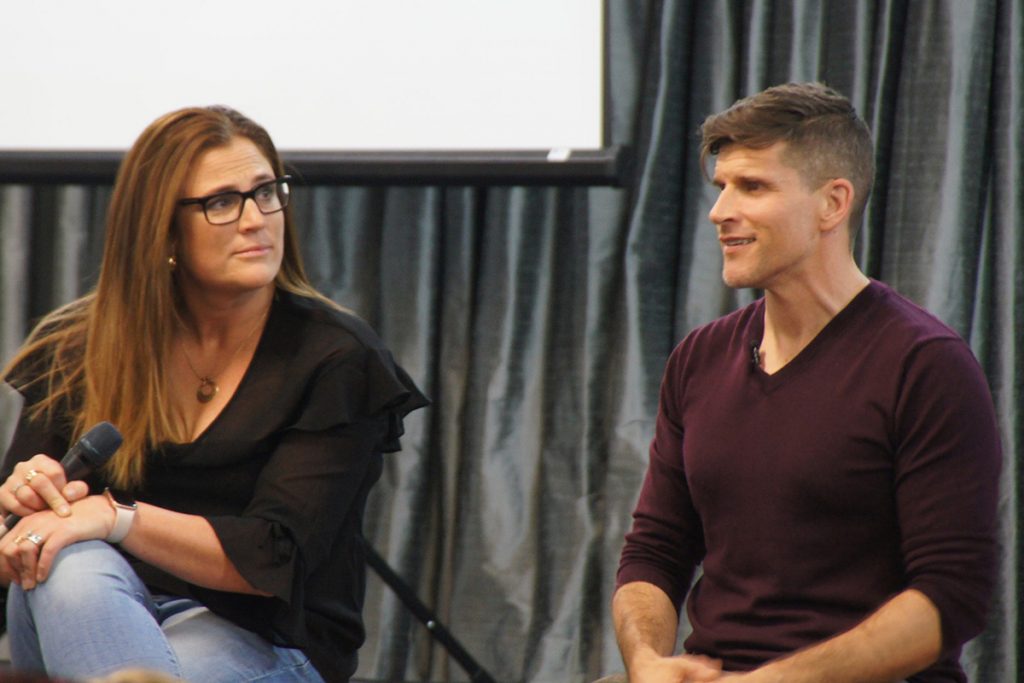
Robinvale is a small, rural and remote community on the Victorian border situated between Swan Hill and Mildura. With a population of around 8,000 people, the entire area is part of the Victorian food bowl, and the main businesses are agribusiness and horticulture. As a result, there is a relatively large section of the community that is seasonal and transient. Demographically, about 70% of the community is of CALD background.
The Robinvale Network House is committed to empowering community and individuals through a range of educational and community capacity building programs to meet the needs of the local community. Robinvale Network House’s Coordinator, Carolyn Martinussen, explained that people in Robinvale are generally supportive of each other, however there are high levels of stigma surrounding mental health and/or alcohol and other drugs (AOD).
“In a small community, the ripple effect of a person and / or family hurting through mental health, AOD or suicide is devastating – many of us know the person and / or their family. For the most part, people are supportive of each other, however, this can change if the stigma of mental health and / or AOD is present,” she said.
This, combined with the element of shame and lack of knowledge about where or how to access services, was becoming an increasing issue in the community. Following several suicides, the community decided it was time to proactively address these issues.
To assist in continuing the conversation, and to complement and promote available services, Robinvale Network House planned the Be SAFE Mental Health Forum. It would refocus on a range of issues about mental health, AOD and suicide, aiming to decrease the stigma on each topic.
Through FRRR’s In a Good Place program, funded by CCI Giving, they secured funds to have celebrity Osher Gunsberg speak about his struggle with mental illness. The aim was to encourage the community to speak up and be part of the conversation surrounding mental health and AOD issues. Representatives from headspace also attended and answered questions from attendees, while allied health staff from Robinvale District Health Services handed out brochures from other agencies detailing their services and contact details.
The response to the Be SAFE Mental Health Forum was positive, with around 200 people from Robinvale, Euston, Mildura, Balranald and Swan Hill turning out to hear Osher speak of his life living with mental health problems. While Osher’s story was certainly informative and relevant, Carolyn Martinussen said that the most valuable part of the evening was the unscripted questions from the floor, which lasted for an hour.
“I’ve been in my role for 19.5 years and have organised many projects and programs in that time. Almost every person present came up to me to thank me for organising this event. [The Chairman of Robinvale Network House], who was attending a suicide prevention conference in Hobart, rang me at 7am the next morning [and said] his social media feed was full of comments about the event”.
Ms Martinussen said that someone received a text message from a mate the day after the event. His mate was in crisis but because he had seen and listened to Osher the night before, he felt he knew how to help and could be there for his mate when he needed it the most. Be SAFE was an example of how members in small communities all pitch in to make things happen.
Council donated the use of the Community Centre and provided an AV technician to oversee sound and video on the night; volunteers set up the venue, even the local primary school stepped in with a data projector.
There was no marketing budget for the event, however flyers were produced and circulated, and social media was put to very good use. The event received excellent coverage from the local media outlets – Sunraysia Daily, local ABC Breakfast radio, and a podcast where local Councillor Jade Benham interviewed Osher on The Vale Podcast “Conversations in Cars” recorded on the trip from Mildura to Robinvale for the event.
Osher himself posted on his social media about the event and the Robinvale area:
“What a night we had in Robinvale, last night. Thank you everyone who drove so far to come to hear me speak. I was so grateful to speak about Mental Health here, and thanks for a superb Q&A afterwards, also it was cracking to meet everyone. Massive gratitude to the team that brought me out here, Sue & Carolyn – and Jade from The Vale Podcast for the great chat.”
Osher Gunsberg
Two prominent local men and their partners, all of whom were there on the night, also appeared on The Vale Podcast “Bringing it home”, candidly discussing depression, attempted suicide, self-medicating, the need to speak up and the caring role of partners.
Since the event, there has been an increased uptake of local Mental Health First Aid training, the local pharmacist reports an increase in mental health related prescriptions being presented, and people have commented that they are using a breathing technique that Osher demonstrated on the night.
Over $100,000 in grants awarded across rural, regional and remote Australia
Bendigo, 12 November 2019: Eight projects that support and encourage good mental health practices in rural, regional and remote communities have received grants from the Foundation for Rural & Regional Renewal via the In a Good Place program.
The projects will share $100,725, thanks to support from CCI Giving, the charitable foundation of Catholic Church Insurance (CCI).
Over a million dollars in grant funding was requested in this third round of In A Good Place, highlighting the need for mental health interventions across rural, regional and remote Australia.
“This third round saw an increase in the number of applications using art-based activities as a tool to encourage community engagement around mental health and resilience,” said FRRR CEO, Natalie Egleton.Successful applications include a safe space to enable mental health conversations at the Julia Creek Dirt & Dust Festival – an area of Queensland deeply impacted by drought and flood; creative community workshops and an interactive theatre performance addressing mental ill-health and substance abuse in Hopetoun, Western Australia; and a series of targeted workshops for adolescent and adult men, focusing on improving mental health and reducing the risk of suicide in Kimba, South Australia.
“Training and skill development, particularly Mental Health First Aid, was also a strong theme. It’s been well-documented that people living in rural, regional and remote Australia don’t have the same access to health services as major metropolitan centres. This includes a lack of early intervention services, and often there are long waiting periods for services in neighbouring communities. These grants will help communities to really take charge and be as self-sufficient as possible when it comes to taking care of their own.”
Roberto Scenna, CEO of CCI and Director of CCI Giving, said that his organisation was pleased to provide funding for another round of the In A Good Place program.
“It’s vitally important that every single one of us feels empowered when it comes to our mental health. The unfortunate reality is that societal pressures and factors such as where you live mean that that’s not always possible. These grants will make a real difference throughout rural, regional and remote Australia.”
The next round of the In a Good Place program will open in February 2020. Keep an eye on FRRR’s grants calendar for the details.
The complete list of locally-led projects that have been funded this round is below.
|
Organisation |
Project |
Location |
Grant |
|---|---|---|---|
|
Apostolic Church Australia, as the Operator of a PBI |
Building a Stronger You |
Bourke, |
$10,000 |
|
Parkes High School P&C |
Parkes High Mental Health Awareness Day |
Parkes, |
$6,750 |
|
Julia Creek Dirt and Dust Festival Inc. |
Have a Yack in the Outback |
Roma, |
$10,000 |
|
University of South Australia |
A mental wellbeing program delivered in partnership with community-based men’s mental health support groups and rural South Australian football clubs / leagues |
Kimba, |
$19,900 |
|
Huon Valley Council |
Mental Health Community Response |
Dover, |
$9,255 |
|
Beyond the Bell Great South Coast |
Live4Life Southern Grampians |
Hamilton, |
$16,340 |
|
Youth Affairs Council Victoria Inc |
Deadly Yarning & Learning: Our Mental Health |
Swan Hill, |
$13,480 |
|
Ravensthorpe Regional Arts Council |
Raving About Mental Wellness |
Hopetoun, |
$15,000 |
Bendigo, 4 June 2019: Seven projects that support and encourage good mental health practices in rural, regional and remote communities have received grants from the Foundation for Rural & Regional Renewal via the In a Good Place program.
“The applications we received confirms that there is significant need when it comes supporting good mental health in rural, regional and remote communities,” said FRRR CEO, Natalie Egleton.The projects will share $99,275, thanks to support from CCI Giving, the charitable foundation of Catholic Church Insurance (CCI).
“Mental ill-health doesn’t discriminate based on whether you live in a rural or metropolitan area. The difference is that those who live in rural areas often struggle when it comes to finding the help they need; at the time they need it. This could be due to geographic location, a lack of resources or access to mental health services, cultural barriers or stigma.
“Through our programs, we’ve seen increased requests for support around mental health across the country. This isn’t surprising given the compounding impacts of the long-running drought, floods or cyclones, as well as economic factors, which can lead to increased stress and social isolation.
“These factors also mean that usual community fundraising options to support local initiatives are simply not available, making programs like In a Good Place increasingly important.”
Ms Egleton says that the projects funded support community-based, non-clinical, and accessible mental health information and support. This includes indirect education via community events, and proactive resilience programs, in schools and the wider community.
Among the recipients is a project involving a series of community activities to bring community members together to reduce social isolation, build stronger interpersonal connections, and create awareness of good mental health practices, following a high-profile local tragedy. The aim is to help people recognise that it is ‘okay not to be okay’ and to provide information about where to access help when required.
Roberto Scenna, CEO of CCI and Director of CCI Giving, said that it was inspiring to see communities responding to mental health challenges in ways that suit them best.
“The funded projects might be for information sharing, skills and capacity building but it’s these non-clinical approaches to mental health care that can assist people at their most vulnerable,” said Mr Scenna.
The next round of the In a Good Place program will open in early July. Keep an eye on FRRR’s grants calendar for the opening date.
The complete list of locally-led projects that have been funded this round is below.
|
Organisation |
Project |
Location |
Grant |
|---|---|---|---|
|
Blue Mountains Women’s Health & Resource Centre Inc. |
Creative Connections |
Katoomba |
$2,970 |
|
Clarke Creek State School P&C Association |
Clarke Creek Chaplaincy |
Clarke Creek |
$10,000 |
|
Moranbah Primary P&C Association |
Supporting students at risk across three Moranbah State schools |
Moranbah |
$15,000 |
|
Operation Flinders Foundation Inc |
Exercise 5SA19 – Mannum Community College Team Build the capacity of the Mannum community to support local at-risk youth students to participate in a remote outback intervention program, and support their reengagement with the local community on their return. |
Mannum |
$20,000 |
|
Mallacoota Community Health, Infrastructure and Resilience Fund Inc (CHIRF) |
Building the evidence base – Effectiveness of Teen Clinics |
Bega Mallacoota |
$20,000 |
|
Robinvale Network House Inc |
Be SAFE |
Robinvale |
$11,553 |
|
Westonia Community Resource Centre Inc |
United we care – United we conquer |
Westonia |
$19,752 |
Bendigo, 7 February 2019: FRRR and CCI Giving are now inviting applications to the In a Good Place grants program to support projects that improve mental health in rural, regional and remote communities Australia-wide.
In A Good Place is the centrepiece of a five-year partnership between CCI Giving and FRRR. It is based on a shared belief in the value and importance of rural regional and remote communities and a commitment to strengthening mental health and wellbeing within those communities.The program is funded by CCI Giving, the charitable foundation of Catholic Church Insurance (CCI) and administered by FRRR. It offers grants of up to $20,000 from an annual pool of $200,000. There is $100,000 is available in this funding round.
The program offers grants for community-driven initiatives that reduce social isolation, increase social participation and connectedness, and increase help-seeking for people within rural, regional and remote communities who are at risk of, or are experiencing mental health issues.
Roberto Scenna, CEO of CCI and Director of CCI Giving, said that the program’s opening is timely, especially as the worsening drought and other challenges take a toll on the land and the communities that call it home.
“It’s imperative that people work together to support one another, and these grants can be a way to develop stronger, more resilient communities by implementing local solutions to local issues. CCI Giving is proud to be facilitating assistance like this via FRRR.”
FRRR CEO, Natalie Egleton said that mental health support is always in high demand.
“Many people living in rural and regional Australia can put on a good front, even when they are doing it tough. Even those that do recognise they need help often can’t readily access the right resources when it comes to their mental health,” said Ms Egleton.
“That’s why grants from In A Good Place are so important. They can help ensure access to the right resources and services, when people need it, and without them having to leave their support-networks.”
The inaugural 2018 round of the In a Good Place program supported 14 groups to instigate place-based responses to improve the mental health and wellbeing of their community members. This included approaches as diverse as local counselling and response training; increasing the resilience and coping skills of young people; performance-based, youth-led responses; connecting and supporting isolated members of the community; holding community healing events following significant local trauma; and community events to build resilience and connectedness across members of all ages.
In 2019, applications are invited from organisations delivering inclusive, responsive and local solutions that will enhance people’s mental health and build social connections. Applications open on 7 February 2019, and close 14 March 2019. Further information on the guidelines are available on the In a Good Place web page.
FRRR expects this will be a highly competitive program and strongly recommends potential applicants contact FRRR to discuss the suitability of their project before applying. Priority will be given to initiatives that:
- Are delivered via non-clinical first providers of mental health care, such as school counsellors and teachers, members of the clergy or pastoral care teams, neighbourhood or community groups, or via technological or other innovative methods;
- Improve accessibility and availability of mental health services, tools or support to areas with limited or no access to the same;
- Provide innovative responses that are inclusive, building social connections that lead to better mental health;
- Confront stigma surrounding help-seeking behaviour.

